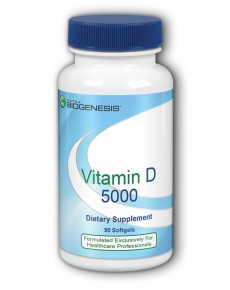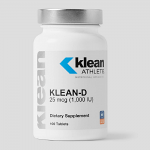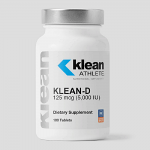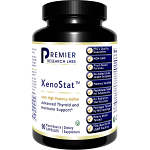Vitamin D 5000

Vitamin D 5000
| SKU | BG205 | |
| Brand | BioGenesis Nutraceuticals | |
| Unit Size | 90 Softgels | |
| Dosage | Use only as directed. Take 1 softgel per day or as directed by a healthcare practitioner. Keep tighty capped and store in a cool, dry place. | |
| Description | Vitamin D 5000 - Supports calcium homeostasis and maintenance of bone metabolism* VITAMIN D is well known for its critical role in calcium homeostasis and regulation of bone metabolism, but recent evidence suggests that vitamin D may also play important roles in promotion of healthy inflammatory responses, insulin function, innate and adaptive immunity and even healthy body weight.* However, dietary sources of vitamin D are slim and most endogenous production of vitamin D occurs through the skin’s exposure to sunlight. Cholecalciferol, also known as vitamin D3, is formed from 7-dehydrocholesterol in the skin after exposure to UV light. Cholecalciferol is hydroxylated to calcidiol (25[OH] vitamin D) in the liver and then to calcitriol (1,25[OH]2 vitamin D), the active form of vitamin D, in the kidneys. However, many individuals are in areas of limited sunlight or use liberal amounts of sun protective factors (SPF) in sunscreen lotions, both of which limit vitamin D production in the skin and may necessitate vitamin D supplementation.* BONE HEALTH: Vitamin D contributes to bone health in several ways. For one, vitamin D inhibits parathyroid hormone activity which acts to maintain serum calcium and phosphate levels by inducing osteoclast activity. Osteoclasts break down skeletal bone to release calcium. Additionally, calcium absorption in the gut requires adequate vitamin D levels. Various studies have found an association between low vitamin D serum levels and joint disorders as well as decreased bone density. Risk for progression of these disorders increases substantially with low vitamin D intake and resultant decreased serum levels.* INFLAMMATION: Vitamin D promotes a healthy inflammation response. Recent studies analyzing the cellular events through which vitamin D balances inflammation look at vitamin D’s influence on lipopolysaccharide (LPS)-stimulated inflammatory responses. LPS induces proinflammatory cytokine production (e.g., IL-6 and TNF-α) by activation of mitogen-activated protein kinases (MAPKs). While the proinflammatory cytokines are important for host defense, excessive production leads to unresolved inflammation. The MAPKs are inactivated by MAPK phosphatases (MKP), leading to suppression of proinflammatory cytokine production. Vitamin D’s role in this chain of cellular events is in its activation and upregulation of the gene for MKP-1, thus inactivating MAPKs and balancing the production of proinflammatory cytokines.* BLOOD SUGAR: Low vitamin D levels are strongly associated with increased risk for conditions related to poor insulin function. Normal serum 25(OH) vitamin D concentrations have been shown to support normal insulin function and healthy blood sugar management. Vitamin D supports insulin sensitivity of of liver, fat and muscle cells and has been shown to support β-cell function in a healthy pancreas. Additionally, vitamin D helps balance the inflammatory cytokines that destroy β-cells in a healthy pancreas.* IMMUNE HEALTH: Vitamin D is involved in the development and function of both innate and adaptive immunity. Vitamin D receptors are found on macrophages, dendritic cells and T-cells. Calcitriol promotes macrophage differentiation and dendritic cell maturation. Macrophages play a key role in cell-mediated immunity by phagocytosing pathogens and cellular debris. Macrophages, along with dendritic cells, also interact with the adaptive immune system by acting as antigen-presenting cells (APCs). Vitamin D enhances and balances TH1 and TH2 immune responses.* BODY WEIGHT: New research is emerging on vitamin D’s role as a metabolic signal for storing fat. It has been proposed that physiologically, a low level of this “sunshine” vitamin may signal the body it is wintertime and thus may shift the body into a state of fat storage and weight gain. * |
|
| Ingredients | ||











